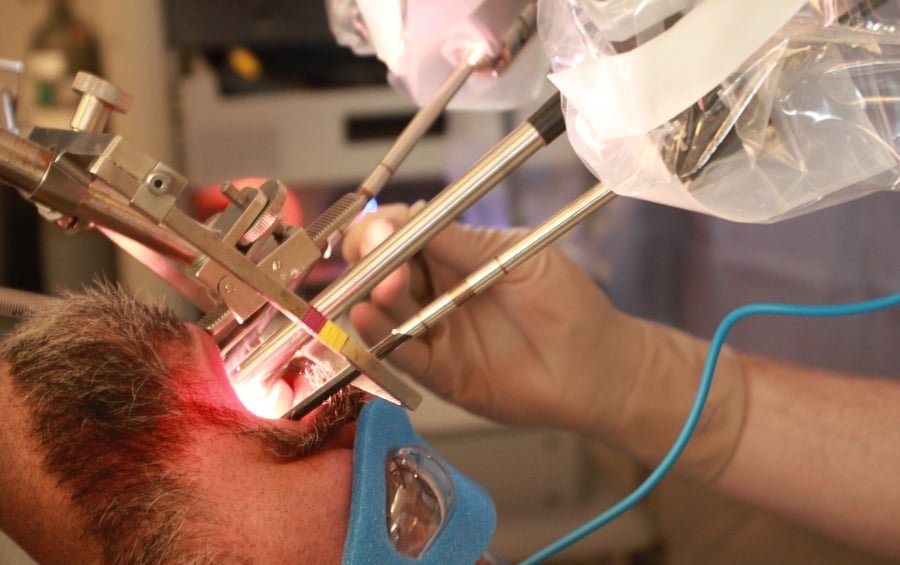
The mainstay of treatment for oropharyngeal squamous cell carcinoma is chemoradiotherapy. The separation of oropharyngeal cancers into Human papillomavirus (HPV) positive and negative based on the etiology has shown that HPV positive cancers have a better prognosis and survival compared to HPV negative cancers. These young age HPV positive patients with prolonged survival are more prone to the late-onset toxicities of chemo-radiotherapy. Hence recently there is a shift in treatment paradigm to surgery, especially transoral minimally invasive ones like TORS (Transoral Robotic Surgery) as the treatment of oropharyngeal cancers.
Data from earlier retrospective studies have shown that Transoral Robotic Surgery (TORS) is ideal and better for the treatment of early squamous cell carcinoma of the oropharynx.
A retrospective study by Morisod B et al on “transoral surgery versus radiotherapy“ has shown equivalent efficacy of both treatment options in terms of disease control for early-stage oropharyngeal squamous cell carcinoma.
Another retrospective analysis by Hutcheson et al on “functional outcomes after TORS” for oropharyngeal cancer in 441 patients who underwent TORS with or without adjuvant therapy has shown better swallowing and other functional outcomes with TORS than radiotherapy.
These studies promoted the use of TORS as the main surgical treatment modality in oropharyngeal cancers. Hence TORS received quick popularity irrespective of its high initial establishment cost.
But all the above-mentioned studies were retrospective ones which were the major drawback of them. As of now, no randomized prospective trials exist regarding the role of TORS in oropharyngeal cancers.
Currently, three prospective randomized trials on “TORS versus radiotherapy” are ongoing, these are ECOG 3311, EORTC 1420 and ORATOR trial. Of this, the interim report of the ORATOR trial got published recently. The early results from other trials are expected in 2021.
ORATOR Trial
ORATOR (Oropharynx: Radiotherapy Versus Trans-Oral Robotic Surgery) is a phase II prospective trial which studies the swallowing outcome of oropharyngeal squamous cell carcinoma patients treated with TORS or radiotherapy.
The ORATOR trial is headed by Anthony Nichols, MD, of London Health Sciences Centre (LHSC) in Ontario, Canada, and colleagues.
The trial was initiated in June 2012, with primary endpoints as quality-of-life outcomes at the end of 1, 3, 5 years and secondary endpoints including overall survival, progression-free survival, toxicity.
Patients with oropharyngeal primary tumors staged T1 or T2 and regional lymph node status of N0, N1, or N2 were included in the study. These patients were first stratified by HPV status and were then randomly assigned to receive radiotherapy or TORS with concurrent neck dissection.
Nichols’ team assessed swallowing function using MD Anderson Dysphagia Inventory (MDADI) scores – which range from 20 to 100, with higher scores representing a better quality of life.
The early reports published included 68 patients from six hospitals in Canada and Australia, 34 per group with a median follow-up of 25 months show an unexpected outcome – patients treated with radiotherapy showed a superior swallowing related quality of life scores at 1 year after treatment. Six patients in the radiotherapy group experienced dysphagia compared with nine in the TORS group.
“Our findings challenge the notion that TORS leads to better swallowing outcomes,” says Dr. David Palma, Associate Scientist at Lawson and Radiation Oncologist at London Health Sciences Centre’s (LHSC).
As described in the Lancet Oncology, the nearly 7-point advantage in MDADI scores (86.9 vs 80.1, respectively, P=0.042) suggests that patients in the radiotherapy group may have improved swallowing function — but to be considered “clinically meaningful,” the difference had to be at least 10 points.
The toxicities and other adverse outcomes on study can be tabulated as follows
| Toxicity | Neutropenia | Hearing loss | Tinnitus | Trismus | Dysphagia | Mucositis | Death |
| Radiotherapy | 6.18% | 13.38% | 12.35% | 1.3% | 6 | 4 | 0 |
| TORS+Neck dissection | 0 | 5.15% | 2.6% | 9.26% | 9 | 1 |
Other notable findings from the trial are – 100% of patients in the radiotherapy group could have an oral diet with no restrictions compared with 84% patients in the TORS group (p=0.055).
No survival difference was observed between patients who underwent radiotherapy or TORS as of now, but the trial is not sufficiently powered to detect a survival difference.
“The findings of ORATOR trial contradict previous retrospective studies that favored surgery over radiation, and indicate that patients should be informed of both options. Each therapy has its different potential side effects but our findings suggest that TORS is not superior to modern radiation,” says Dr. Nichols.
Though its the first randomized trial on TORS vs radiotherapy in oropharyngeal cancers, the study was associated with some pitfalls like
- A short follow-up period and a small patient population are the major drawbacks of the ORATOR trial. To overcome these limitations, a larger follow-up trial, ORATOR2, is now underway to evaluate the quality of life and survival rates between the two approaches in human papillomavirus (HPV)-associated oropharyngeal cancers.
- MD Anderson Dysphagia Inventory (MDADI) scoring is a subjective evaluation that can be “strongly influenced” by anxiety and depression of the patient. An objective test like fiberoptic endoscopic examination of swallowing (FEES) or a videofluoroscopy will be much better.
- As mentioned above, the trial is not sufficiently powered to detect a survival difference.
References
- Morisod B, Simon C. Meta-analysis on survival of patients treated with transoral surgery versus radiotherapy for early-stage squamous cell carcinoma of the oropharynx. Head Neck.2016; 38:E2143–E2150.
- Hutcheson KA, Holsinger FC, Kupferman ME, et al. Functional outcomes after TORS for oropharyngeal cancer: A systematic review. Eur Arch Otorhinolaryngal. 2015; 272:463–471.
- Nichols AC, Theurer J, Prisman E, Read N, Berthelet E, Tran E, Fung K, de Almeida JR, Bayley A, Goldstein DP, Hier M. Radiotherapy versus transoral robotic surgery and neck dissection for oropharyngeal squamous cell carcinoma (ORATOR): an open-label, phase 2, randomized trial. The Lancet Oncology. 2019 Aug 12.